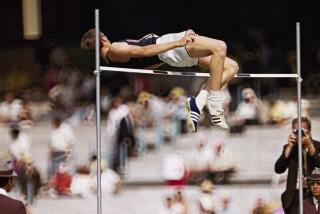A. Melin, 77; Introduced Frisbee and Hula Hoop
Arthur “Spud” Melin, co-founder of Wham-O Inc., which gave the world such leisure icons as the Frisbee, the Hula Hoop and the Superball--along with such duds as Instant Fish--has died. He was 77.
Melin, who had Alzheimer’s disease, died Friday in Newport Beach. He had lived for many years in San Gabriel before his retirement.
Travel broadens one, it is often said, and it certainly gave Melin ideas. Both the Hula Hoop and Instant Fish sprang from Melin’s interest in other parts of the world.
His great success story was the Hula Hoop. Melin and his wife, Suzy, became aware of children in Australia and elsewhere around the South Pacific playing with a bamboo or rattan ring by swinging it around their hips.
He suggested they start making the toy at Wham-O, the San Gabriel-based company he had started with his childhood friend, Richard Knerr. The Americans had trouble duplicating the moves of the Australian kids until a Wham-O executive, Richard Gillespie, finally mastered the art after four straight days of practice.
Wham-O introduced the Hula Hoop in 1958 and was soon producing 20,000 a day. Other companies began making their own versions, and within four months Americans were spinning 20 million of the hoops and organizing national competitions. Over the years, Wham-O churned out 25 million Hula Hoops.
Richard A. Johnson, author of the book “American Fads,” declared the Hula Hoop “the undisputed granddaddy of American fads.... No sensation has ever swept the country like the Hula Hoop,” he wrote.
Melin’s African-inspired bright idea fared poorly in comparison. While visiting that continent he saw a little fish that buried its eggs in mud during the dry season. When the rains came, the eggs hatched. Melin thought he could sell chunks of egg-embedded mud, instruct buyers to add water, and provide fish to delight the millions.
But the imported fish produced no hatchable eggs. More than $1 million accepted in orders by Wham-O had to be refunded and the project was abandoned.
When Melin and Knerr started their company in 1948, they named it for the sound made by their top product--a slingshot hitting its target. They also offered mail-order sporting goods, such as pellet guns, crossbows and daggers.
But they hit the big time when Walter Frederick Morrison walked in with a toy flying disk, marrying the 1950s furor over UFOs and a game played by Yalies tossing empty pie tins from the Frisbie Baking Co. in Hartford, Conn.
Wham-O began selling the plastic disks in 1957 as Pluto Platters. Initially, Melin and Knerr marketed them on college campuses by word of mouth.
“We didn’t want it used as a toy,” Melin told the Pasadena Star-News in 1998. “We wanted it to be a sport.”
Nevertheless, the public of all ages also adopted them, buying more than 100 million Frisbees in 30 years.
Just why Melin and Knerr changed the disk’s name to Frisbee in 1958 remains debatable. Some versions say Knerr had become aware that the idea had come from flinging the Frisbie pie tins, and he changed the spelling slightly to trademark the name. Knerr was also quoted in 1997 as saying the name came from a comic strip called “Mr. Frisbie.”
In 1965, while Hula Hoops were still rolling out the door, Melin and Knerr introduced the Superball, a small rubber ball with an exceptionally high bounce invented and patented by chemist Norman H. Stingley. Within six months, they sold 7 million Superballs.
Wham-O was also responsible for a few ideas that did not etch themselves into popular history as indelibly as the Frisbee, the Hula Hoop or the Superball. In the height of the Cold War, when families were building backyard bunkers to live in following nuclear attack, Wham-O marketed Do-It-Yourself Fallout Shelters for $119.
And in answer to a music and dance fad of the era, it also marketed Chubby Checker Limbo sets.
Melin retired from the company when it was sold to Kransco Group Cos. in 1982. Wham-O was resold to Mattel Inc. in 1994 and to a group of investors in 1997.
Along with his wife, Melin is survived by five daughters, Linda, Sally, June, Carol and Della; one brother, Tom; and 11 grandchildren. Services are being planned in Newport Beach on Tuesday.
More to Read
Sign up for The Wild
We’ll help you find the best places to hike, bike and run, as well as the perfect silent spots for meditation and yoga.
You may occasionally receive promotional content from the Los Angeles Times.






